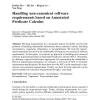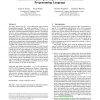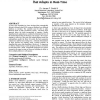275 search results - page 39 / 55 » Sequential Construction of Logical Forms |
KAIS
2007
15 years 1 months ago
2007
Eliciting requirements for a proposed system inevitably involves the problem of handling undesirable information about customer’s needs, including inconsistency, vagueness, redun...
122
click to vote
PLPV
2009
ACM
15 years 10 months ago
2009
ACM
This paper is part of a line of work on using the logical techniques of polarity and focusing to design a dependent programming language, with particular emphasis on programming w...
107
Voted
ICFP
2006
ACM
16 years 1 months ago
2006
ACM
The development of design patterns in object-oriented programming aims at capturing good software design in a re-usable generic form. However, design patterns are not expressible ...
123
click to vote
ICFP
2005
ACM
16 years 1 months ago
2005
ACM
This paper defines PolyAML, a typed functional, aspect-oriented programming language. The main contribution of PolyAML is the seamless integration of polymorphism, run-time type a...
141
Voted
GECCO
2005
Springer
15 years 7 months ago
2005
Springer
A fuzzy logic algorithm has been developed that automatically allocates electronic attack (EA) resources distributed over different platforms in real-time. The controller must be ...



